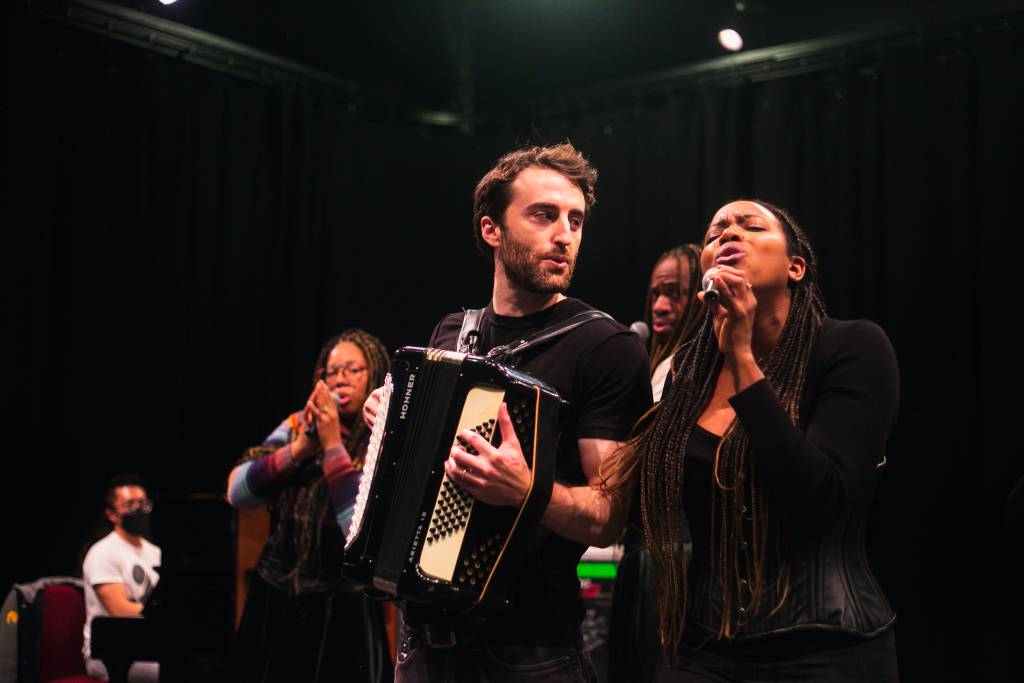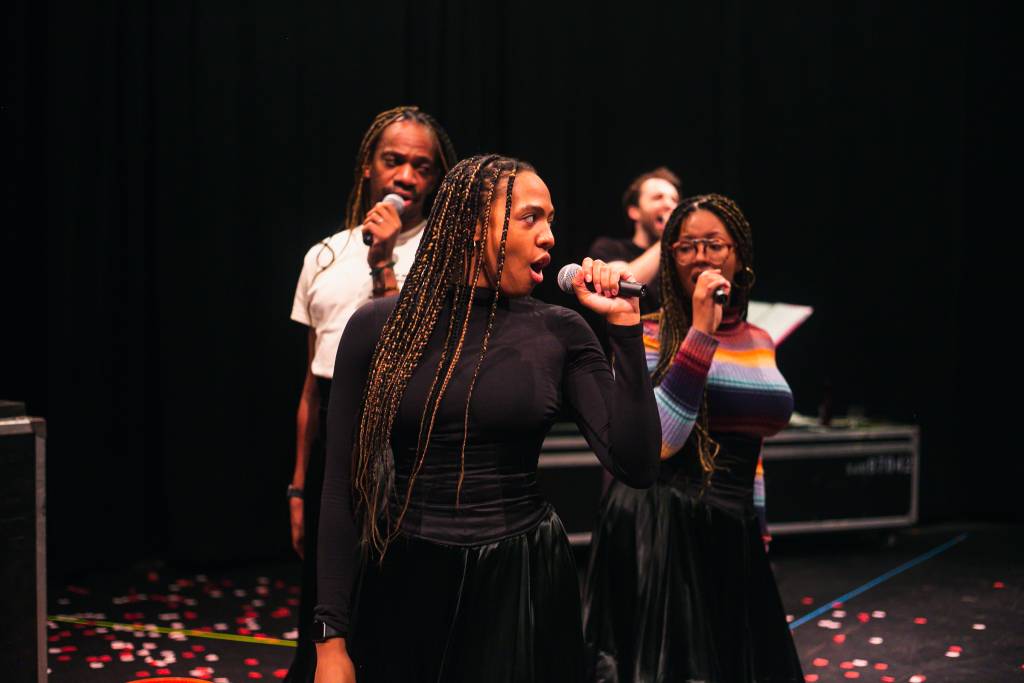
Steven Cuevas at the piano with Kira Helper, Charlie Thurston, Reggie D. White, and Whitney White in rehearsal for Macbeth In Stride.
Photo: Lauren Miller
Presented by American Repertory Theatre
Created and performed by Whitney White
Orchestrations Steven Cuevas and Whitney White
Music Director Steven Cuevas
Choreography Raja Feather Kelly
Directed by Tyler Dobrowsky and Taibi Magar
October 23 – November 14, 2021
Audio Described Performances: Friday, November 12 at 7:30PM and Saturday, November 13 at 2PM
Open Captioned Performances: Thursday, November 11 at 7:30PM and Saturday, November 13 at 2PM
Loeb Drama Center
Cambridge, MA
ART on Facebook
Review by Diana Lu
Macbeth in Stride is a lush pop, rock, gospel, and R&B musical theater event that can only be described as An Experience. It is the first of a five-part series by Obie Award-winning artist Whitney White examining the women of Shakespeare through a black, queer, feminine lens. I’m often skeptical of shows with stated agendas like this, but Macbeth in Stride delivered far more than what was promised, in more ways than I expected.
White knows Shakespeare to its core and conveys that knowledge from her bones.
She is a great writer with exceptional control of her craft. The music, playwriting, incorporation of the original Shakespearean text, and breaking the 4th wall all weaved together like one of those giant storyboard tapestries hung on the walls inside a Tudor castle. She is a great performer as well. The musical numbers are boppin’, and her soliloquies are intimate and emotionally resonant.
I loved that my favorite characters, Lady Macbeth and the witches, got some serious stage time and that she overtly explored the relationship between them that was missing from the original text. Women held power in many pre-colonial civilizations, and it was common practice for colonizing patriarchies to gain control by demonizing them as monsters and witches. Thus a black female monarch would be the natural representative for the Weird Sisters.
I loved that the show wasn’t just about Lady Macbeth as feminine (or black queer feminine) ambition and freedom in a man’s (or white cis straight male) world, as it has been touted to be. Let’s be real: it is not subversive anymore for any woman to take on masculine traits or to want power. That story arc is shallow and stale, and if Macbeth in Stride were only that, the show would have been painful to watch.
White doesn’t pretend we live in a world without Condoleeza, Michelle, or Kamala that nevertheless spent the last 30 years bombing the middle east. She calls out representation politics for what it is, with Lady Macbeth asking what happens when an individual representative of a marginalized group comes into power. Does she dismantle the system? Nope, reply the witches, the system becomes her. She gets to host a dinner party.

Reggie D. White, Phoenix Best, Charlie Thurston, and Kira Helper in rehearsal for Macbeth In Stride.
Photo: Lauren Miller
What I loved most about Macbeth in Stride were the dramatic moments in the second act, in which White breaks from character to critically comment on the characters from her perspective as a life-long reader. White’s analysis of Lady Macbeth and her relationship to her husband being an impetus for the former’s bloodthirsty ambition created a character that made sense as a human being to me.
The subtext that White imparted showed the original play’s description of Lady Macbeth’s madness and subsequent offstage death for the deus ex machina that it was. It became no longer a tale of feminine evil and insanity to be condemned or girl-boss ambition to be lauded, but of fragile humanity and the invisibility of feminine labor. How different would the story have been if Macbeth were capable of performing–or even seeing–the emotional labor and care work for his partner that she needed?
The show rips apart the canonical text to scrutinize Macbeth and the Bard with a black feminine gaze. White questions the original play about every facet of human experience missing or not fully explored. There is nothing more subversive than endowing the “othered” with wholeness and humanity. I’ve seen a lot of reimaginings of Shakespeare, including the recent fad of feminist reworkings. White queers the Bard pointedly and poignantly, making this Macbeth in Stride (and hopefully her whole series) exceptional above all others.
